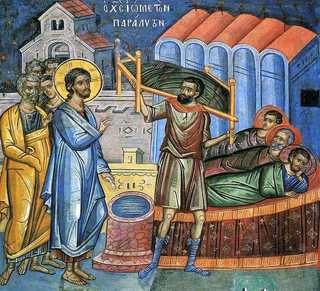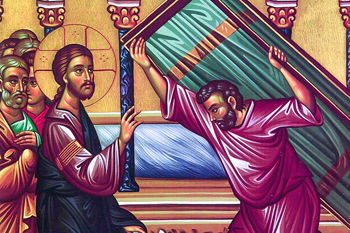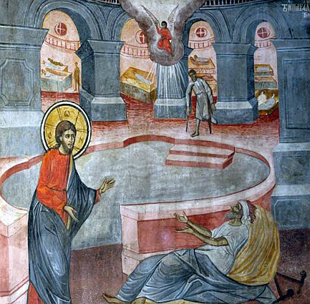For Sunday May 26, 2019
Lectionary Readings (Revised Common Lectionary, Year C)
Acts 16:9-15
Psalm 67
Revelation 21:10, 22:1-5
John 14:23-29 or John 5:1-9
If you’ve spent any time reading the Gospels, then you know that Jesus asks in-your-face questions. “Do you love me?” “Why are you so afraid?” “Are you also going to leave?” “How long shall I put up with you?” “Do you still not understand?”
But the question he asks in this week’s Gospel story might be the most jarring of all. The setting in which he asks it is Jerusalem, near a pool by the Sheep’s Gate. In the five porticoes by the pool, the chronically sick and disabled of the city lie waiting. Rumor, legend, or tradition has it that an angel visits the pool at random times, stirring up the water, and giving it healing properties. The first person to step into the pool after the angel disturbs it, receives healing.
In our story, Jesus visits this outdoor nursing home, finds a man lying by the pool who has been sick for thirty-eight years, and approaches him with a question. No introductions. No small talk. No sermon. Just a question: “Do you want to be made well?”
Is it just me, or is this an uncomfortable-making question? How would you feel if you were unwell for close to four decades, and a stranger came along one day and asked if you really wanted to get better? Implying that your ongoing sickness was at least partially your fault. Implying that you were benefiting, consciously or unconsciously, from remaining sick. Implying that you were somehow invested in your brokenness, that you had stakes in it, that your identity was so wrapped up in your infirmity, weakness, or defeat, you couldn’t imagine your life without your illness.
How would you feel? How would you respond? Would you hear pure insult in the question? Or would you hear a faint echo of the truth? The kind of truth that hurts?
Let me be clear. I don’t believe that Jesus is “blaming the victim” in this story. All four Gospels attest to his deep compassion for the sick and the disabled. Not once in Scripture does he respond to pain or illness with contempt, mockery, or condescension. Not once does he tell a sick person that her illness is her own fault. In fact, he corrects that cultural misunderstanding about disease and disability at every opportunity.
 |
All of that to say: I trust Jesus’s heart and his motives enough to take his question in this Gospel story at face value. When he looks at the man who has been languishing by the pool for thirty-eight years, he sees more than sickness. He sees defeat. He sees resignation. He sees psychological and spiritual stagnation. He sees a man whose hope has dwindled. A man whose imagination has atrophied to such a point that he can’t even articulate what he wants for his body, his soul, or his future.
How do I know this? Well, notice that he doesn’t answer Jesus’s question. “Do you want to be made well?” Jesus asks, and the man doesn’t say “yes.” Isn’t that odd? After thirty-eight years of intense suffering, he doesn’t say yes! Instead, he gets defensive. He explains the mechanics of scarcity in his nursing home: “I have no one to put me into the pool.” He makes a compelling case for the cutthroat unfairness of the world: “While I am making my way, someone else steps down ahead of me.” He invites pity, he hems and haws, he dodges. In short, he avoids answering the question Jesus actually asks, which isn’t a question about the man’s circumstances at all, but a question about his heart, his identity, and his desires: “What do you want?”
Has Jesus ever asked you this question? Do you want to be made well from all that stymies, hobbles, paralyzes, and diminishes you? Do you want to stand up? Do you want to walk? Do you want to move?
How have you answered these questions in the past? How would you answer them today? Do you know?
 |
For me, the question stings because I know exactly what it’s like to say I want out, to say I want freedom, to say I want healing — and not quite mean it. I know what it’s like to cling to brokenness because it’s familiar. I know what it’s like to make victimhood my identity. I know what it’s like to benefit from the very things that cause me harm. I know what it’s like to sink into self-pity. I know what it’s like to assume that everyone else has access to a magic pill I’ll never get my hands on. I know what it’s like to decide that I’m doomed to sit at the very edge of healing for the rest of my life, and never attain it.
For me, the question stings because the very idea that God cares about what I want — that he’s curious about my desires, that he wants me to recognize and articulate them — blows me away.
But if I’m willing to sit with the uncomfortable truths at the heart of this week’s Gospel story, maybe I can come to know that Jesus’s desires for me aren’t murky and two-sided like mine are. He wants me to be made well. Period. He wants me to walk again. To thrive again. To live again. He wants to deliver me from the paralysis of my past, my baggage, my fear, my laziness. He wants me to want, and to want fiercely. He wants me to say, “Yes.” Do you want to be made well? Yes.
If there’s anything more remarkable in this Gospel story than Jesus’s question, it’s what happens after he asks it. “Stand up, take your mat and walk,” Jesus tells the man. And the man does exactly that. "At once," John tells us, “the man was made well, and he took up his mat and began to walk.”
 |
Notice that the man never asks for healing. There’s no indication in the story that he even knows who Jesus is. Notice that Jesus makes no reference to belief, as he often does when he performs a healing miracle. He doesn’t tell the man,“Your faith has made you well,” because that would be a lie. Notice that Jesus doesn’t dwell on the man’s past; he doesn’t dredge up the loss and waste of the thirty-eight years the man can’t get back. And notice that he doesn’t heal the man on the man’s terms — by helping him into the pool when the angel stirs the water. Jesus simply tells the man to get up and walk. And he does.
What I take away from this story is that Jesus is always and everywhere in the business of making new and making well. His desire to heal is intrinsic to his character — it doesn’t depend on me. In other words, “Do you want to be made well?” is a question he will never stop asking, because his heart’s desire is for my wholeness, my freedom, and my thriving, and he understands that there is painful, surgical power in the question itself. Confronting the zinger question of what we want — what we really want — is how the work of healing begins.
Debie Thomas: debie.thomas1@gmail.com
Image credits: (1) Orthodox Christianity; (2) Greek Orthodox Archdiocese of America; and (3) Ancient Answers.





